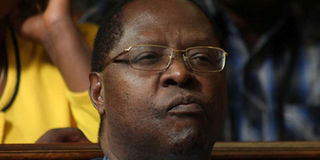Embu's bad bookkeeping led to double allowances, says EACC

Embu Governor Martin Wambora at the Supreme Court in Nairobi on January 30, 2019, ahead of a ruling on a petition against his election. PHOTO | DENNIS ONSONGO | NATION MEDIA GROUP
What you need to know:
- The concern was raised during the presentation of a Corruption Risk Assessment report on the systems, policies, procedures and practices of the county assembly.
- The anti-graft agency found that some MCAs signed two attendance registers indicating they attended two meetings simultaneously, thereby earning illegal allowances.
- In financial management, the EACC revealed that bank reconciliations for the assembly’s recurrent, development, gratuity, car loan and mortgage accounts were not done in time, making it difficult to detect and correct errors
The Ethics and Anti-Corruption Commission (EACC) has raised the red flag over the double payment of committee sitting allowances to Embu Ward Representatives due to bad bookkeeping.
The concern was raised on Thursday during the presentation of a Corruption Risk Assessment report on the systems, policies, procedures and practices of the county assembly.
The anti-graft agency found that some members of county assembly signed two attendance registers indicating they attended two meetings simultaneously, thereby earning illegal allowances.
REGISTERS
In a report delivered by Emily Chege, the Deputy Director for Corruption Prevention, the commission also noted that some attendance registers were not closed after committee meetings, leaving a loophole for absent ward reps to add their signatures and fraudulently draw allowances.
The EACC also observed that MCAs were allowed to sign the register after it was closed.
The assembly was consequently advised to install an incorruptible biometric registration system that would capture MCAs who physically attended meetings without the loophole of allowing absentees to sign later.
Speaker Josiah Thiriku said plans were underway for the acquisition and installation of biometric scanners in committee meeting rooms and the main assembly chambers.
BANK RECORDS
In financial management, the EACC revealed that bank reconciliations for the assembly’s recurrent, development, gratuity, car loan and mortgage accounts were not done in time, contrary to regulation 90 of the Public Finance Management Act.
This made it difficult to detect and correct errors.
The commission also established that some payments were done without examination of vouchers and entries in the vote book, a loophole for irregular payments.
Holders of standing imprests were advised to maintain memorandum cashbooks, which were not in place especially in ward offices.
COMPLAINTS
The report also faulted the assembly for not having a well-structured system of managing both internal and external complaints for accountability purposes.
The report stated that it was impossible to prioritise areas of intervention, including those related to corruption, unethical conduct, irregularities and delays in service delivery.
Use of personal emails to conduct official business was also flagged as an information, communication and technology (ICT) flaw that could lead to loss of vital correspondence through theft by hackers.
The assembly was advised to enforce the use of institutional emails for data security.
EACC Commissioner Rose Mghoi Macharia presented the report to Speaker Thiriku and Deputy Clerk James Munyi, who pledged to implement all the recommendations to streamline the legislature’s activities.
The meeting was silent about whether money paid out twice would be recovered.





